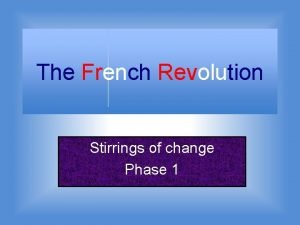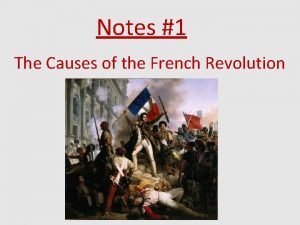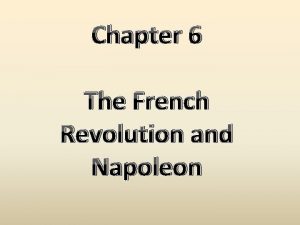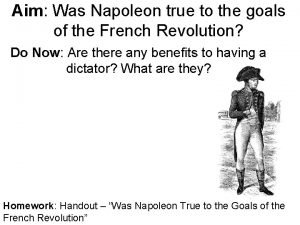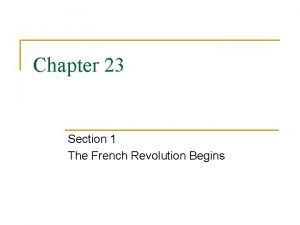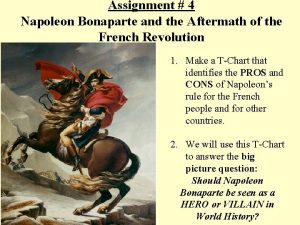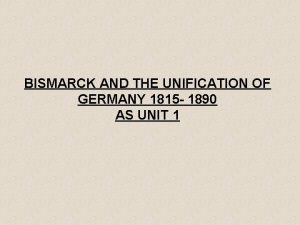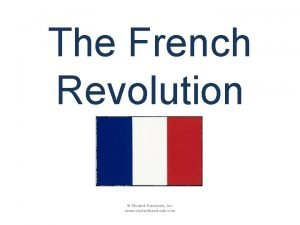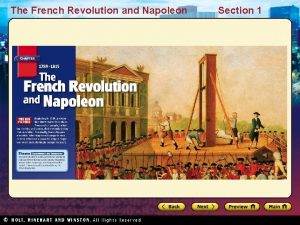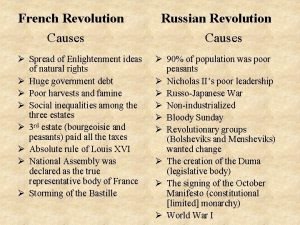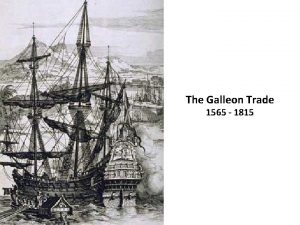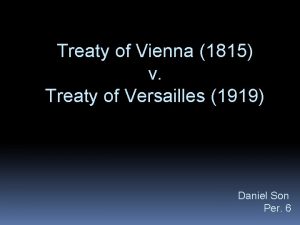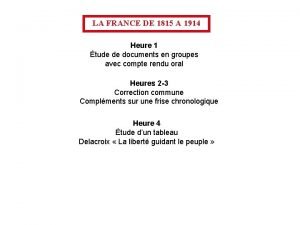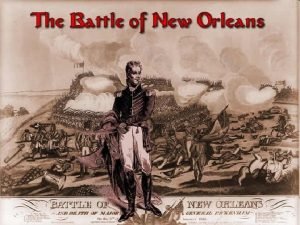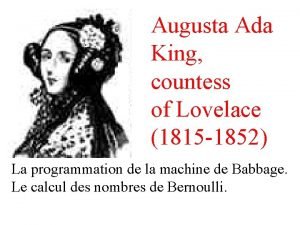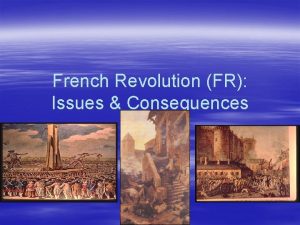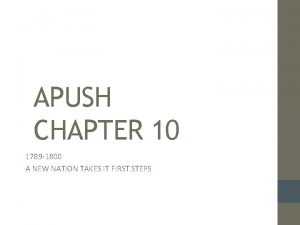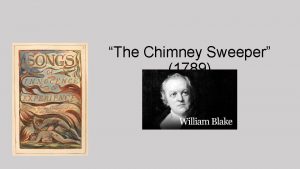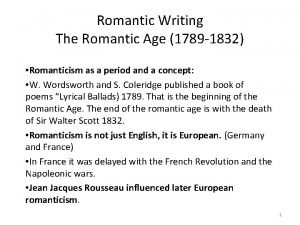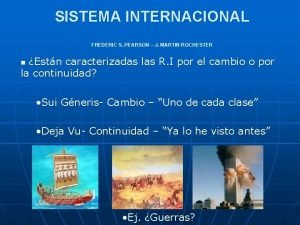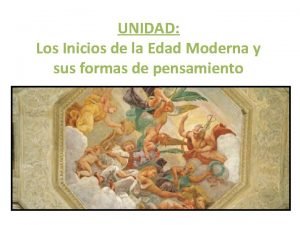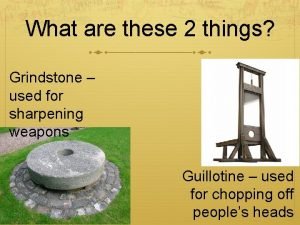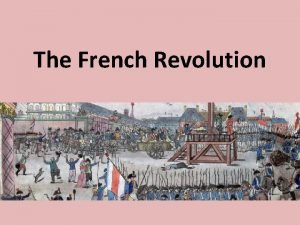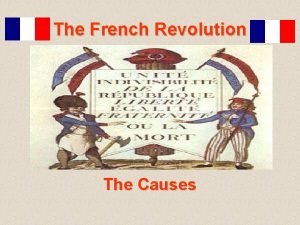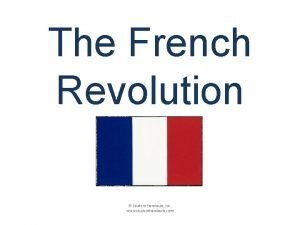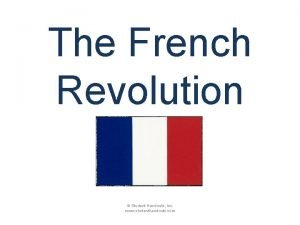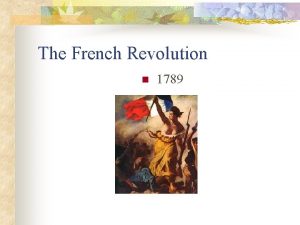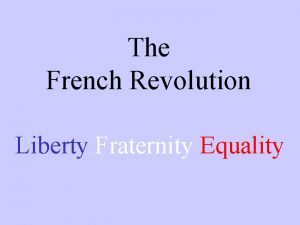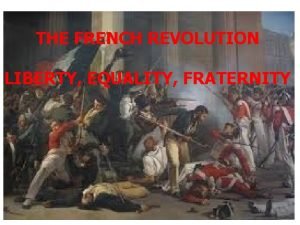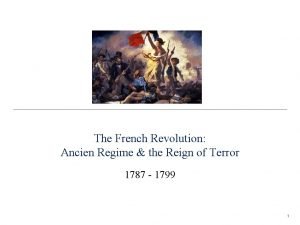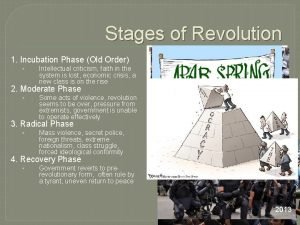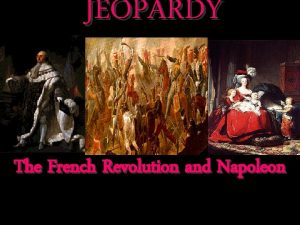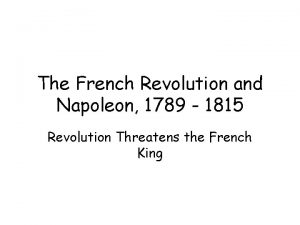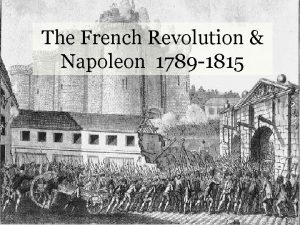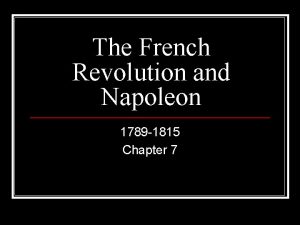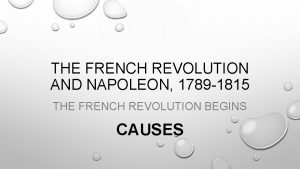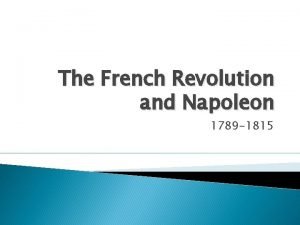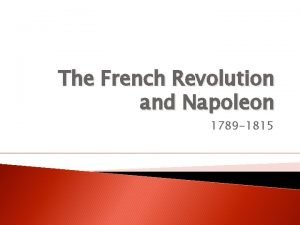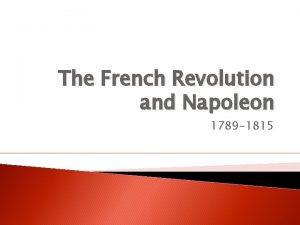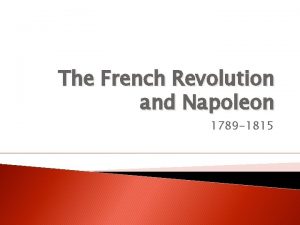The French Revolution And Napoleon 1789 1815 Chapter












































































- Slides: 76

The French Revolution And Napoleon (1789– 1815) Chapter 19

The Old Regime Under the ancien regime, or old order, everyone in France belonged to one of three classes…. .

n FIRST ESTATE – Clergy n SECOND Nobles n THIRD ESTATE – Bourgeoisie & Peasants

The Old Regime CLERGY n Enjoyed privilege enormous wealth and n Owned about 10 percent of land, collected tithes, and paid no taxes n Provided some social services

The Old Regime NOBILITY n Owned income n Hated land but had little money absolutism n Feared losing traditional privilege, especially exemption from taxes

The Old Regime BOURGEOISIE and PEASANTS n Peasants were 90 percent of French population n Resented privilege of first and second estates n Burdened n Many by taxes earned miserable wages and faced hunger and even starvation

Economic Trouble in France Economic woes added to social unrest & heightened social tension For years, the French government had engaged in deficit spending

Economic Trouble in France King Louis XIV left France deeply in debt recent wars general rise in costs in the 1700 s

Economic Trouble in France lavish court bad harvests in late 1780 s sent food prices soaring poorer peasants and city dwellers hungry & lack resources

Economic Trouble in France To bridge gap between income and expenses, government borrowed more and more money

Meeting of the Estates General § France’s economic crisis worsened § bread riots spread § nobles denounced royal tyranny § Louis XVI summoned the Estates General

Meeting of the Estates General § Third Estate declared themselves to be the National Assembly § invited delegates from other two estates to help write a constitution

Meeting of the Estates General § reform-minded clergy and nobles joined the Assembly § Louis XVI grudgingly accepted it

Storming of the Bastille n July 14, 1789 n more than 800 Parisians gathered outside the Bastille prison n demanded weapons believed to be stored there.

Storming of the Bastille n commander of Bastille opened fire on crowd, and a n battle ensued n many people were killed

Storming of the Bastille n storming of the Bastille became symbol of the French Revolution & a blow to tyranny n French still celebrate July 14 as Bastille Day

Four Phases of French Revolution o 1789 -1791 National Assembly o 1792 -1793 escalating violence led to the 1793 -1794 Reign of Terror o 1795 -1799 Directory o 1799 -1815 Age of Napoleon

Popular Revolts n political crisis of 1789 coincided with the worst famine in memory n starving peasants roamed the countryside or flocked to the towns n even people with jobs had to spend most of their income on bread

Popular Revolts nvarious power factions competed for npeasants attacked homes and manors of nobles

Popular Revolts nrumors ran wild nset off the “Great Fear” nradical group called Paris Commune replaced royalist government of Paris

Reforms of the National Assembly POLITICAL Proclaimed all male citizens equal before the law Limited the power of the monarchy

Reforms of the National Assembly POLITICAL Established the Legislative Assembly to make laws Granted all tax-paying male citizens the right to elect members of the Legislative Assembly

Reforms of the National Assembly SOCIAL & ECONOMIC Abolished special privileges of the nobility Announced an end to feudalism Called for taxes to be levied according to ability to pay

Reforms of the National Assembly SOCIAL & ECONOMIC Abolished guilds and forbade labor unions Compensated nobles for lands seized by peasants

Reforms of the National Assembly RELIGIOUS Declared freedom of religion Placed French Catholic Church under control of the state

Reforms of the National Assembly RELIGIOUS Took over and sold Church lands Provided that bishops and priests be elected and receive government salaries

Foreign Reaction ►Supporters of Enlightenment applauded the reforms of the National Assembly ►They saw the French experiment as the dawn of a new age for justice and equality

Foreign Reaction ►European rulers and nobles denounced the French Revolution ► 1791 monarchs of Austria and Prussia issued Declaration of Pilnitz - threatened to intervene to protect the French monarchy

Radicals and the Convention n. Radicals took control of the Assembly ncalled for election of a new legislative body called National Convention

Radicals and the Convention ngranted suffrage to all male citizens, not just to property owners nconvention set out to erase all traces of old order

Radicals and the Convention nvoted to abolish monarchy and declare France a republic n. Jacobins, who controlled the Convention, seized lands of nobles and abolished titles of nobility

From Convention to Directory oearly 1793, France at war with most of Europe opeasants and workers in rebellion against the government

From Convention to Directory o. Convention itself bitterly divided o. Convention created the Committee of Public Safety

From Convention to Directory o. To deal with threats to France, the Reign of Terror lasted from July 1793 to July 1794. o. Under Maximilien Robespierre, some 40, 000 people were executed at the guillotine

Reign of Terror ¢Reign of Terror lasted July 1793 to July 1794. ¢Under Maximilien Robespierre, some 40, 000 people were executed at the guillotine

Reign of Terror ¢In reaction to Reign of Terror, moderates created another constitution, the third since 1789. ¢The Constitution of 1795 set up a five-man Directory and a twohouse legislature

Women in the Revolution Women of all classes participated in the revolution from the very beginning Many women were disappointed when Declaration of the Rights of Man did not grant equal citizenship to women

Women in the Revolution Olympe de Gouges – Declaration on the Rights of Woman Divorce was easier – weakened Church authority Women could inherit property – undermine tradition of nobles leaving estates to eldest son

Changes in French Society By 1799 French Revolution had: udislodged the old social order, uoverthrown ubrought control the monarchy, and Church under state

Changes in French Society uthe tricolor emerged utitles eliminated uelaborate fashions are replaced by practical clothes

Changes in French Society udeveloped a strong sense of national identity u. Nationalism spread throughout France u. Civic festivals celebrated the nation and the revolution

Changes in French Society u. Social reform and religious toleration u. State schools replaced religious ones u. Organized system to help poor, soldiers, and war widows

Changes in French Society u. Abolished slavery in colonies u. In an effort to de. Christianize, they adopted a secular calendar u. Public ceremonies to boost support for republican and nationalist ideals

Rise of Napoleon n 1769 - Born on island of Corsica 1793 - Helps capture Toulon from British; promoted to brigadier general 1795 - Crushes rebels opposed to National Convention

Rise of Napoleon n n 1796– 1797 Becomes commander in chief of the army in Italy; wins victories against Austria 1798– 1799 Loses to the British in Egypt and Syria

Rise of Napoleon n n 1799 Overthrows Directory & becomes First Consul of France 1804 Crowns himself emperor of France

France Under Napoleon § Napoleon consolidated power by strengthening the central government § Order, security, and efficiency replaced liberty, equality, and fraternity as the slogans of the new regime

France Under Napoleon instituted a number of reforms to restore economic prosperity § Controlled prices § Encouraged new industry § Built roads and canals § Public schools under government control

France Under Napoleon §Concordat of 1801 – peace with Church §Encouraged émigrés to return §Recognized peasants’ right to land purchased §Jobs were open to talent

France Under Napoleon § Napoleon developed a law code, the Napoleonic Code § embodied Enlightenment principles – equality of all citizens before the law, religious toleration, and advancement based on merit

France Under Napoleon undid some of the reforms of the French Revolution: § Women lost most of their newly gained rights § Male heads of household regained complete authority over wives and children

Building an Empire n Annexed areas including the Netherlands, Belgium, and parts of Italy and Germany n Abolished the Holy Roman Empire

Building an Empire n Created the Confederation of the Rhine n Cut Prussia in half n Turned part of Poland into Grand Duchy of Warsaw

France versus Britain • 1805 Napoleon prepared to invade England • Defeated at the Battle of Trafalgar • Waged economic warfare through the Continental System – closing European ports to British goods

France versus Britain • Britain responded by setting up blockades on ports to keep out French ships • British attacks on American ships eventually set off the War of 1812

France versus Britain • Napoleon’s Continental System failed to bring Britain down • Trade restrictions caused a scarcity of food in Europe, send prices soaring, and intensified resentment against the French

Challenges to Napoleon’s Empire - Impact of Nationalism Although it spurred army to success, it worked against them too Ø Europeans who had welcomed Revolution ideas now saw Napoleon and his armies as oppressors Ø Resented Continental System and his effort to impose French culture Ø

Challenges to Napoleon’s Empire - Resistance in Spain Ø Ø Napoleon replaced the Spanish king and introduced reforms to undermine the Catholic Church Spanish resisted, French brutally repressed, spurring Sp. nationalism Spanish started guerrilla warfare British joined in the fight against the French in Spain

Challenges to Napoleon’s Empire - War with Austria Ø Ø Spanish resistance encouraged Austria 1805 Battle of Austerlitz 1809 Austrians sought revenge, but lost at battle of Wagram Divorce Josephine and married Austrian princess Marie Louise

Challenges to Napoleon’s Empire - Defeat in Russia Ø Ø Russians were unhappy about economic effect of Continental Sys. Napoleon had enlarged the Grand Duchy of Warsaw Russia had withdrawn from the Continental System In response to this, Napoleon assembled his Grand Army

Ø 1812, over 400, 000 invaded Russia ØRussians retreated burning crops as they went ØOnly 10, 000 soldiers survived – many died or deserted

Downfall of Napoleon Exile and Return n In 1814 Napoleon abdicated his throne n He was exiled to the Island of Elba n Louis XVIII was returned to power n March 1815 Napoleon returned to the country to cheers

Downfall of Napoleon Battle of Waterloo • Triumph was short lived – only 100 days • June 18, 1815, near town of Waterloo, Belgium

• Duke of Wellington and General Blucher beat the French • Napoleon was forced to abdicate and exiled to St. Helena

Legacy of Napoleon l. Napoleonic Code consolidated many changes of the revolution l. France was a centralized state with a constitution l. Elections were held with expanded, though limited, suffrage l. Many more citizens had rights to property and access to education

Legacy of Napoleon l. Spread ideas of the revolution l. Sparked nationalist feelings l. Abolition of Holy Roman Empire eventually helped create a new Germany l. In 1803, he sold the Louisiana Territory to the American govt

Congress of Vienna ¡ Gathering of Leaders – Prince Clemens von Metternich of Austria, Czar Alexander I of Russia, and Lord Robert Castlereagh of Britain. France was represented by Prince Charles Maurice de Talleyrand.

Congress of Vienna ¡ The chief goal was to establish a lasting peace by establishing a balance of power and protecting the system of monarchy. ¡ They redrew the map of Europe and ringed France with strong countries.

French Revolution LONG-TERM CAUSES l Corrupt, inconsistent, and insensitive leadership l Prosperous members of the Third Estate resent privileges of the First and Second Estates l Spread of Enlightenment ideas

French Revolution IMMEDIATE CAUSES l. Huge government debt l. Poor harvests and rising price of bread l. Failure of Louis XVI to accept financial reforms

French Revolution IMMEDIATE CAUSES l. Formation of National Assembly l. Storming of the Bastille

French Revolution IMMEDIATE EFFECTS l. Declaration of the Rights of Man and the Citizen adopted l. France adopts its first written constitution

French Revolution IMMEDIATE EFFECTS l. Monarchy abolished l. Revolutionary France fights coalition of European powers l. Reign of Terror

French Revolution LONG-TERM EFFECTS l. Napoleon gains power l. Napoleonic Code established l. French public schools set up

French Revolution LONG-TERM EFFECTS l. French conquests spread nationalism l. Revolutions occur in Europe and Latin America

French Revolution CONNECTIONS TO TODAY l. French law reflects Napoleonic Code l. France is a democratic republic
 Chapter 11 the french revolution and napoleon
Chapter 11 the french revolution and napoleon Chapter 23 the french revolution and napoleon
Chapter 23 the french revolution and napoleon Chapter 11 the french revolution and napoleon
Chapter 11 the french revolution and napoleon The tennis court oath
The tennis court oath What was an immediate cause of the 1789 french revolution
What was an immediate cause of the 1789 french revolution Cahiers french revolution
Cahiers french revolution 2nd estate
2nd estate The french revolution and napoleon section 1 quiz
The french revolution and napoleon section 1 quiz Napoleon 1789
Napoleon 1789 Was napoleon true to the goals of the french revolution
Was napoleon true to the goals of the french revolution Russian revolution vs french revolution
Russian revolution vs french revolution Could the french revolution have been avoided
Could the french revolution have been avoided French revolution cartoon analysis
French revolution cartoon analysis The french revolution begins chapter 7 section 1
The french revolution begins chapter 7 section 1 Chapter 23 section 1
Chapter 23 section 1 Chapter 6 section 2 the french revolution unfolds
Chapter 6 section 2 the french revolution unfolds Emperor napoleon
Emperor napoleon Napoleon sells louisiana
Napoleon sells louisiana Liberalism and nationalism in germany 1815-71
Liberalism and nationalism in germany 1815-71 Causes and effects of french revolution
Causes and effects of french revolution Causes and effects of the french revolution
Causes and effects of the french revolution French revolution
French revolution French revolution causes and effects
French revolution causes and effects French revolution causes and effects
French revolution causes and effects 3 ideas of the enlightenment
3 ideas of the enlightenment Outcome of french revolution
Outcome of french revolution Jack and jill french revolution
Jack and jill french revolution 1750 ottoman empire
1750 ottoman empire What is the route of the galleon trade from 1565 to 1815?
What is the route of the galleon trade from 1565 to 1815? Scopul sfintei aliante
Scopul sfintei aliante Congress of vienna vs treaty of versailles
Congress of vienna vs treaty of versailles 1799-1815
1799-1815 Frise chronologique 1815 à 1870
Frise chronologique 1815 à 1870 Frise chronologique 1815 à 1914
Frise chronologique 1815 à 1914 In 1816 took a little trip
In 1816 took a little trip 1815
1815 Lovelace 1815
Lovelace 1815 Lovelace 1815
Lovelace 1815 Metternichovský absolutismus
Metternichovský absolutismus Green revolution vs third agricultural revolution
Green revolution vs third agricultural revolution Europe in 1789
Europe in 1789 Convention of 1800 apush
Convention of 1800 apush French revolution symbols
French revolution symbols The chimney sweeper 1789
The chimney sweeper 1789 Bolton romanticism amp; politics 1789 1832 download
Bolton romanticism amp; politics 1789 1832 download Frise républiques françaises
Frise républiques françaises Sistema clasico internacional 1648 a 1789
Sistema clasico internacional 1648 a 1789 Europa en 1789
Europa en 1789 Linea de tiempo con las edades de la historia
Linea de tiempo con las edades de la historia The divisions in spanish colonial society 1789
The divisions in spanish colonial society 1789 1797 - 1789
1797 - 1789 July 14 1789
July 14 1789 1789 france
1789 france Against the gods 1789
Against the gods 1789 Art 1789
Art 1789 1789
1789 Grindstone french revolution
Grindstone french revolution French revolution timeline
French revolution timeline Sophie of france (1786-1787)
Sophie of france (1786-1787) Committee of public safety
Committee of public safety Four stages of the french revolution
Four stages of the french revolution French revolution causes
French revolution causes Short term causes of the french revolution
Short term causes of the french revolution The french revolution political causes
The french revolution political causes French revolution timeline
French revolution timeline Fraternity in french revolution
Fraternity in french revolution French revolution
French revolution Four phases of french revolution
Four phases of french revolution French revolution causes
French revolution causes French revolution essential questions
French revolution essential questions Immediate cause of french revolution
Immediate cause of french revolution The ancien regime
The ancien regime Storming of the bastille cartoon
Storming of the bastille cartoon Stages of french revolution
Stages of french revolution Lesson 2 nationalism and political revolutions
Lesson 2 nationalism and political revolutions French revolution jeopardy
French revolution jeopardy French revolution graphic organizer
French revolution graphic organizer



